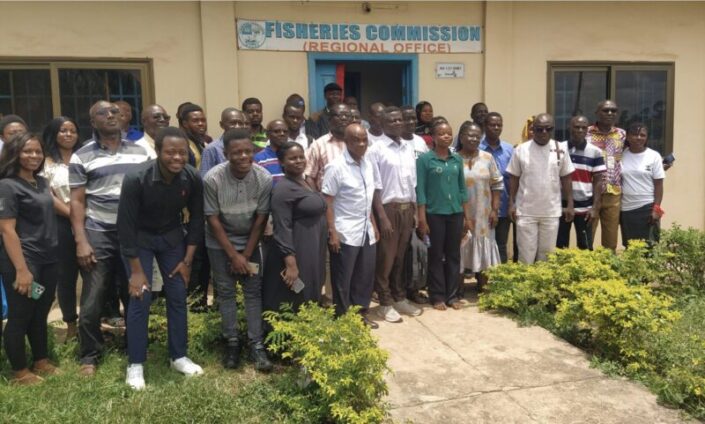Fish farmers have been urged to always contact professionals in aquaculture to draw suitable biosecurity plans for them to implement in their farms.
This would not only help them manage fish mortality and secure their investments but would also contribute to protecting human life since healthy fish would be produced and supplied to the market for consumption.
Mr Theodore K. Owuani, the Ashanti Regional Laboratory Manager of the Fisheries Commission, who made the call, said it was important for people interested in fish farming to have biosecurity in mind, to ensure that they did not record unexpected losses to discourage them.
He was speaking at a biosecurity training workshop for about 58 fish farmers in the Ashanti region.
The training was to help the farmers acquire the requisite skills and knowledge in biosecurity, to help secure their investment by preventing unnecessary fish mortality through the introduction and spread of infections and diseases.
Biosecurity involves management plans and measures put in place to prevent the introduction and spread of infections and diseases among organisms.
Mr Owuani pointed out that though fish mortality should be expected it should not be above 15 per cent of stocked fish, and asked farmers to always contact their zonal officers to introduce them to good hatchery to purchase their brood stock.
This is because, some hatcheries were abusing the use of antibiotics in their farms, and this could cause problems for them, he said.
He indicated that, disease and infection outbreaks depended on three factors which included pathogens, which already existed in the water (environment), the environment and the host (fish).
Mr Owuani, the disease or pathogens in the water manifested when the fish was stressed through overstocking in ponds leading to fish competing for oxygen, poor handling and water parameters.
“When the fishes are stressed, their immune systems break down making them vulnerable to infections and diseases,” he stated.
He named other factors that contributed to infections and disease spread on and between farms as not quarantining new brood stock, poor feed storage, contaminated water and equipment, vectors and others.
Mr Owuani said biosecurity plans were specific to every farm because they had different challenges which needed varied solutions.
He mentioned some biosecurity plans and measures as covering ponds with nets, using clean pathogen-free water sources, sourcing fingerlings from certified hatcheries, and making a pest management programme.
Latest Stories
-
Abuakwa South MP donates GH¢45,200 to support feeding at Kibi School for the Deaf
6 minutes -
‘Just the beginning’ – Finance Minister Ato Forson hails Fitch ratings boost for Ghana
28 minutes -
ALX Ghana event rallies stakeholders to build Africa’s digital future
29 minutes -
Ghana’s inflation to average 15% in 2025 – Fitch
33 minutes -
Telecel leadership pays courtesy calls to new leaders in Ashanti Region
35 minutes -
Ghana’s public debt to fall to 60% in 2025, 2026 – Fitch
36 minutes -
One feared dead, others injured in horrific STC van-tricycle crash in Ho
36 minutes -
Reshaping Africa’s Digital PR Future – Authentic communication with local relevance
46 minutes -
Supreme Court nominee says there is nothing wrong with number of justices on Supreme Court bench
51 minutes -
Payment of nursing trainees’ allowances to be automatic – Mahama
53 minutes -
University of Ghana suspends 14 students, sanctions 97 for exam misconduct
58 minutes -
Personal beliefs must not interfere in rulings on same-sex cases – Supreme Court nominee
60 minutes -
Oil prices fall slightly, but Ghana still at risk as Israel–Iran conflict continues
1 hour -
Justice Sir Dennis Adjei advocates abolition of mandatory death penalty in Ghana
1 hour -
Ghana urges Israel and Iran to de-escalate
1 hour

